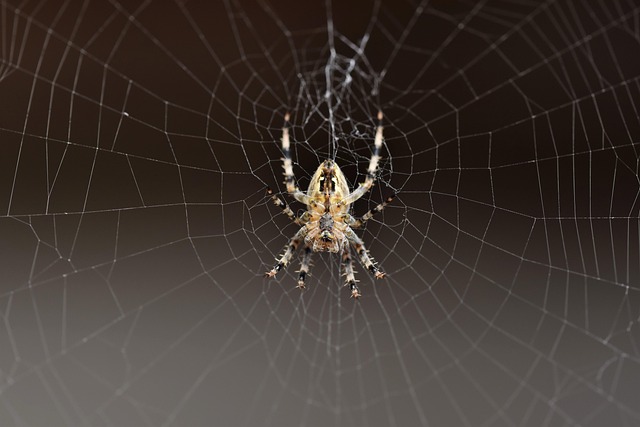Understanding and preventing spider infestations involves recognizing their behavioral patterns and habitat preferences. Regular inspections, sealing entry points, cleanliness, and eco-friendly solutions like essential oils are key for residential prevention. Professional spider control services employ advanced techniques and tailored treatments for effective management in both homes and businesses. By combining these strategies with proactive measures such as spider-proofing, recurring infestations can be significantly reduced.
Tired of recurring spider infestations? Discover innovative tools and strategies to reclaim your space. This comprehensive guide explores effective spider infestation prevention, from understanding their behavior and habitat to professional control methods and eco-friendly solutions. Learn practical tips for spider-proofing your home and environment, ensuring long-lasting protection against these eight-legged intruders. Explore expert advice tailored for both residential and commercial settings, empowering you with the knowledge to tackle spider prevention head-on.
Understanding Spider Infestations: Behavior and Habitat
Understanding Spider Infestations: Behavior and Habitat
Spider infestations can quickly turn from a nuisance to a significant problem, as these arachnids are skilled at hiding in hard-to-reach areas. Professional spider control experts know that preventing recurring infestations involves understanding their behavior and habitat preferences. Spiders are primarily attracted to spaces that offer both shelter and prey. They are often drawn to residential or commercial buildings due to the availability of suitable hiding spots, like cracks, crevices, and dark corners, as well as the presence of insects for food.
To effectively implement spider prevention tips, it’s crucial to spider-proof your home or workplace. This involves regular inspections to identify potential entry points, sealing gaps around windows and doors, maintaining a clean environment by promptly addressing spills and clutter, and using eco-friendly spider prevention solutions that don’t compromise indoor air quality. Commercial spider control services often employ these strategies, but for residential settings, simple yet effective do-it-yourself methods can be equally impactful in deterring spiders from taking up residence.
Professional Spider Control: Expert Strategies for Effective Prevention
Professional Spider Control offers expert strategies for effective spider infestation prevention, especially in residential and commercial settings. These professionals employ a multi-faceted approach combining inspection, identification, and tailored treatments to target spiders’ habits and habitats. Advanced techniques include identifying entry points, using eco-friendly repellents, sealing off potential nesting areas, and implementing regular maintenance plans.
Commercial spider control services often incorporate innovative tools such as heat treatment, gel traps, and mechanical removal, ensuring a thorough and long-lasting solution. For residential spider prevention, professionals suggest regular vacuuming to remove webbing and eggs, along with the strategic placement of sticky traps and the sealing of gaps around windows and doors. By combining these professional spider control tips with proactive measures like spider-proofing your home, individuals and businesses can significantly reduce the risk of recurring spider infestations.
Eco-Friendly Solutions for Residential and Commercial Spider Prevention
In today’s world, where environmental consciousness is on the rise, there’s a growing demand for eco-friendly solutions to common pest problems, including spider infestations. Traditional methods of spider control often rely heavily on synthetic chemicals that can be harmful to both people and the environment. However, professionals in spider control services are now offering innovative approaches to spider prevention and eradication. These include natural repellents, organic treatments, and advanced techniques that target specific behaviors of spiders without causing ecological disruption.
For residential spider prevention, homeowners can adopt several eco-friendly tips. Regular cleaning and decluttering significantly reduce hiding spots for spiders. Using essential oils like peppermint or lavender as natural repellents is also effective. Moreover, sealing entry points and maintaining proper ventilation can deter these arachnids from invading homes. On a commercial scale, pest control for spiders often involves specialized equipment and treatments that are tailored to large spaces. Professional spider control services employ advanced methods, such as heat treatment and mechanical means, to ensure thorough spider-proofing. These techniques not only address existing infestations but also prevent future recurrences in both residential and commercial settings.
Practical Tips for Spider-Proofing Your Home and Environment
Spider infestations can be a recurring nightmare, but with the right approach, it’s possible to keep these eight-legged visitors at bay. A key step in spider infestation prevention is maintaining a clean and clutter-free environment. Spiders are attracted to dark, hidden spaces, so regular cleaning and decluttering can significantly reduce their appeal to your home or business. Focus on eliminating potential hiding spots by vacuuming thoroughly, especially in corners and under furniture.
Professional spider control services often recommend sealing entry points as another effective spider prevention tip. This involves caulking cracks and gaps around doors, windows, and utility pipes to prevent spiders from entering. Additionally, using eco-friendly spider prevention solutions can be a smart choice for those concerned about the environment. Natural repellents like citronella, peppermint oil, or lavender can deter spiders without resorting to harsh chemicals. For residential or commercial spaces, combining these practical tips with regular inspections can ensure a spider-free environment and provide peace of mind.
In conclusion, tackling recurring spider infestations requires a multi-pronged approach. By understanding these arachnids’ behavior and habitat preferences, you can implement effective strategies through professional spider control services or opt for eco-friendly solutions. For homeowners, incorporating practical spider prevention tips into your routine will go a long way in spider-proofing your space. Combining these methods ensures a comprehensive plan to keep spiders at bay, providing lasting relief from unwanted guests in both residential and commercial settings.
